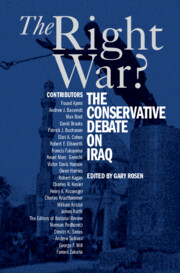Book contents
- Frontmatter
- Contents
- List of Contributors
- Introduction
- 1 Iraq's Future – and Ours
- 2 The Right War for the Right Reasons
- 3 Iraq: Losing the American Way
- 4 Intervention With a Vision
- 5 An End to Illusion
- 6 Quitters
- 7 A More Humble Hawk; Crisis of Confidence
- 8 Time for Bush to See the Realities of Iraq
- 9 Iraq May Survive, but the Dream Is Dead
- 10 The Perils of Hegemony
- 11 Like It's 1999: How We Could Have Done It Right
- 12 Reality Check – This Is War; In Modern Imperialism, U.S. Needs to Walk Softly
- 13 A Time for Reckoning: Ten Lessons to Take Away from Iraq
- 14 World War IV: How It Started, What It Means, and Why We Have to Win
- 15 The Neoconservative Moment
- 16 In Defense of Democratic Realism
- 17 ‘Stay the Course!’ Is Not Enough
- 18 Realism's Shining Morality
- 19 Has Iraq Weakened Us?
- 20 Democracy and the Bush Doctrine
- 21 A Time for Humility
- 22 Birth of a Democracy
- Index
11 - Like It's 1999: How We Could Have Done It Right
Published online by Cambridge University Press: 10 August 2009
- Frontmatter
- Contents
- List of Contributors
- Introduction
- 1 Iraq's Future – and Ours
- 2 The Right War for the Right Reasons
- 3 Iraq: Losing the American Way
- 4 Intervention With a Vision
- 5 An End to Illusion
- 6 Quitters
- 7 A More Humble Hawk; Crisis of Confidence
- 8 Time for Bush to See the Realities of Iraq
- 9 Iraq May Survive, but the Dream Is Dead
- 10 The Perils of Hegemony
- 11 Like It's 1999: How We Could Have Done It Right
- 12 Reality Check – This Is War; In Modern Imperialism, U.S. Needs to Walk Softly
- 13 A Time for Reckoning: Ten Lessons to Take Away from Iraq
- 14 World War IV: How It Started, What It Means, and Why We Have to Win
- 15 The Neoconservative Moment
- 16 In Defense of Democratic Realism
- 17 ‘Stay the Course!’ Is Not Enough
- 18 Realism's Shining Morality
- 19 Has Iraq Weakened Us?
- 20 Democracy and the Bush Doctrine
- 21 A Time for Humility
- 22 Birth of a Democracy
- Index
Summary
Foreign policy is not theology. the only way to make sensible choices in this realm is to weigh costs and benefits. A policy that might have been wise crumbles if the costs become prohibitive. For example, protecting South Vietnam from a communist invasion from the north was a worthwhile goal. The horrendous costs of doing so, however, made it a bad policy. For those of us who supported the war in Iraq, the question is simple – have the costs risen so high that they outweigh any benefit? It's a fair question, since the manner in which Iraq has been handled over the past 18 months has racked up enormous costs. Still, I think the intervention has the potential to be a success if we learn the lessons – the right lessons – of this last year and a half.
I was not one of those who had been urging another war against Iraq ever since the first Gulf war. Through the 1990's, I thought the strategy pursued by the first Bush and Clinton administrations – sanctions and containment – was a reasonable solution to a difficult problem. But, by the late 90's, this strategy was falling apart. In the isolated atmosphere created by sanctions, Saddam Hussein's grip on power had tightened. He had found ways to manipulate the sanctions system by cheating and smuggling (the best estimate of his take is $10 billion).
- Type
- Chapter
- Information
- The Right War?The Conservative Debate on Iraq, pp. 87 - 90Publisher: Cambridge University PressPrint publication year: 2005



